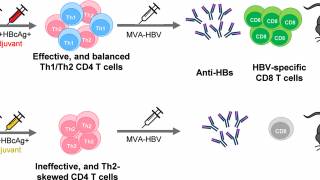Three Antigen Hepatitis B Vaccine Found Effective

Massachusetts-based VBI Vaccines Inc. recently announced that Phase 3 study results of its prophylactic 3-antigen hepatitis B (HBV) vaccine candidate were published in The JAMA Network Open.
The CONSTANT study was designed to demonstrate manufacturing equivalence of three lots of VBI’s HBV vaccine candidate and evaluate the immunogenicity of VBI’s 3-antigen HBV vaccine candidate compared to a single-antigen HBV vaccine, Engerix-B®, after two and three doses, and safety and reactogenicity.
The primary endpoint of lot-to-lot manufacturing consistency, measured by GMC of anti-HBs concentration at Day 196 across three consecutively manufactured lots of VBI’s 3-antigen HBV vaccine candidate, was achieved.
And SPR after two doses, at Day 168, was 90.4% for VBI’s 3-antigen vaccine candidates compared to 51.6% for Engerix-B®, increasing to 99.3% and 94.8%, respectively, after the third dose.
The mean GMC of anti-HBs titers was more than 7.5x higher after two doses, at Day 168, and 3.5x higher after three doses, at Day 196 (5442.4 mIU/mL VBI vs. 1567.2 mIU/mL Engerix-B).
Furthermore, VBI’s 3-antigen vaccine also elicited a higher percentage of participants with anti-HBs titers ≥ 100 mIU/mL, a more stringent titer threshold, of 95.8% vs. 86.3% for Engerix-B at Day 196.
No safety signals were observed in either study arm, and no new safety risks were identified.
Together with results from the first pivotal Phase 3 study, PROTECT, these results formed the basis for the regulatory submissions of VBI’s 3-antigen HBV vaccine candidate in the U.S., Europe, and Canada.
This HBV vaccine is sold under the name Sci-B-Vac® in Israel.
Dr. Timo Vesikari, M.D., Ph.D., Professor Emeritus and Director of the Nordic Vaccine Research Network in Finland, principal investigator of the CONSTANT study, and author of the manuscript commented, commented in a related press statement issued on October 13, 2021, “In North America and Europe, adults age 25-49 years have the highest rates of HBV infection.”
“Unfortunately, it is also this population who has the lowest adherence rates to the full course of vaccination.”
“The data from this pivotal Phase 3 study have meaningful public health importance, demonstrating the ability of the 3-antigen HBV vaccine candidate to elicit high rates of seroprotection and increased antibody titers after both two and three doses in this population compared to the conventional, single-antigen HBV vaccine.”
“Moreover, these data add to the well-established safety profile of this vaccine.”
Hepatitis B is a vaccine-preventable liver infection caused by the hepatitis B virus, says the U.S. CDC.
Hepatitis B is spread when blood, semen, or other body fluids from a person infected with the virus enters the body of someone who is not infected. This can happen through sexual contact, sharing needles, syringes, or other drug-injection equipment, or from mother to baby at birth.
Not all people newly infected with HBV have symptoms, but symptoms can include fatigue, poor appetite, stomach pain, nausea, and jaundice for those who do.
For many people, hepatitis B is a short-term illness.
For others, it can become a long-term, chronic infection that can lead to serious, even life-threatening health issues like cirrhosis or liver cancer.
The risk for chronic infection is related to age at infection: about 90% of infants with hepatitis B develop chronic infection, whereas only 2%–6% of people who get hepatitis B as adults become chronically infected.
The best way to prevent hepatitis B is to get vaccinated, says the CDC.
Various HBV vaccines are listed on this webpage.
PrecisionVaccination publishes fact-checked research-based vaccine news.
Our Trust Standards: Medical Advisory Committee

